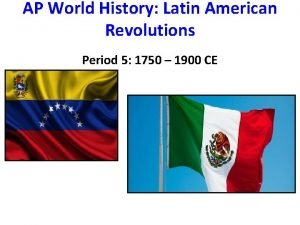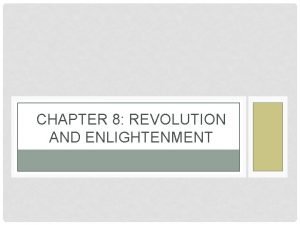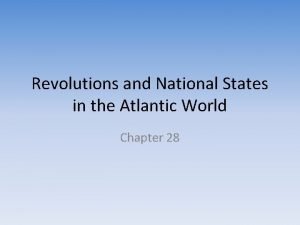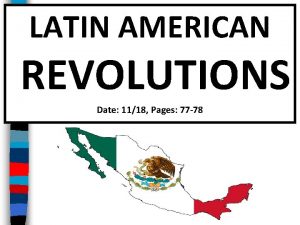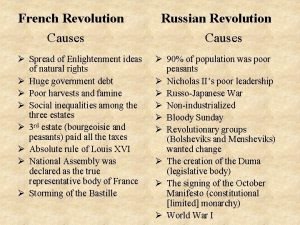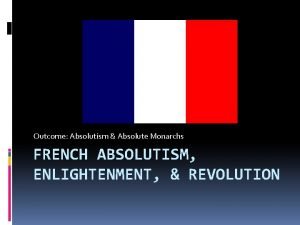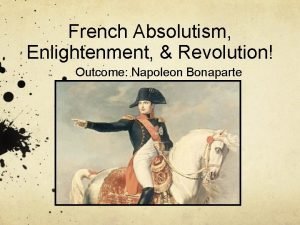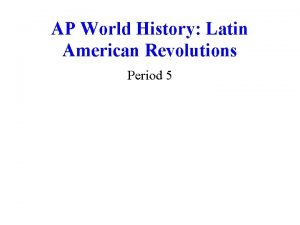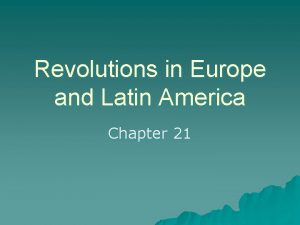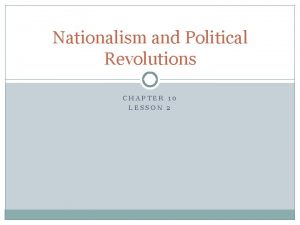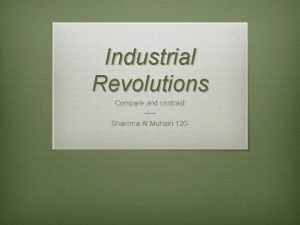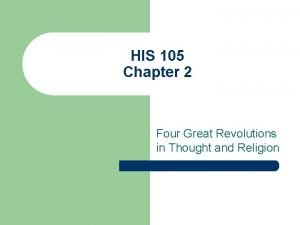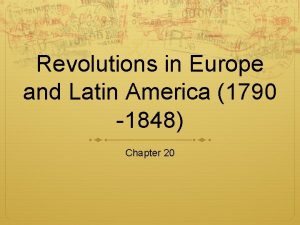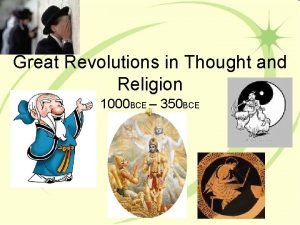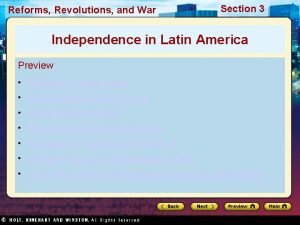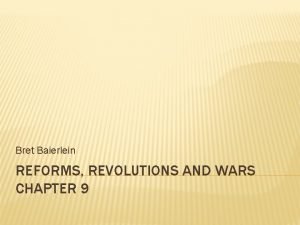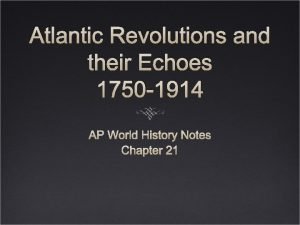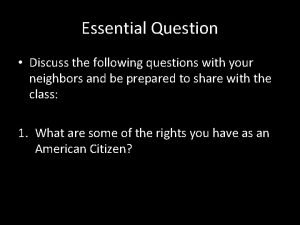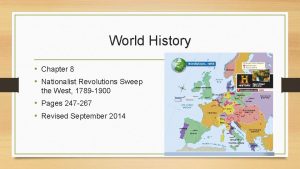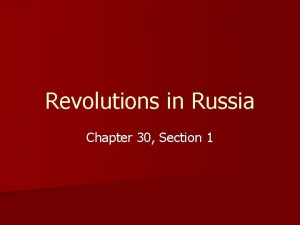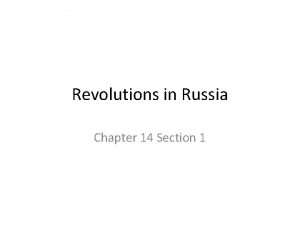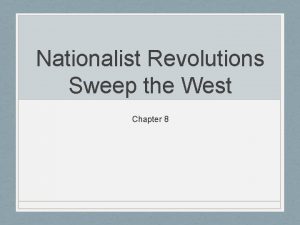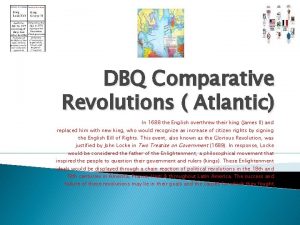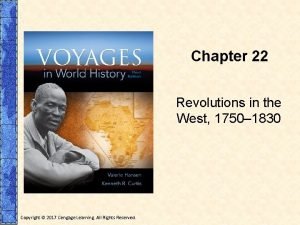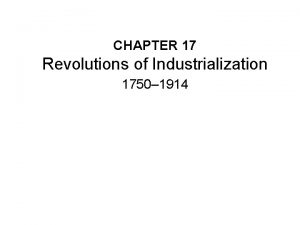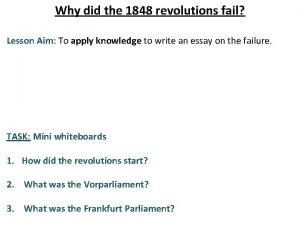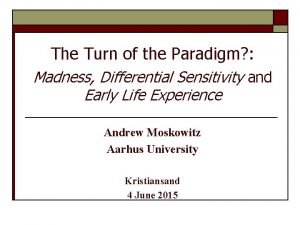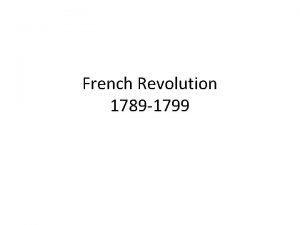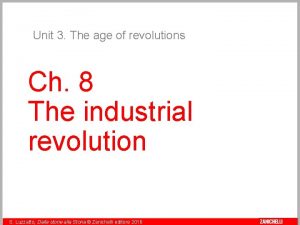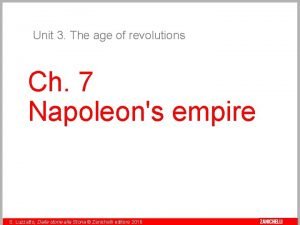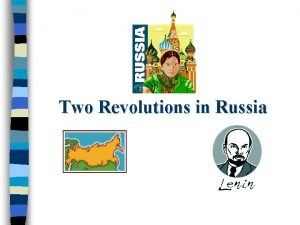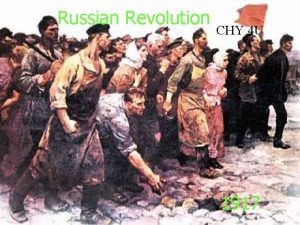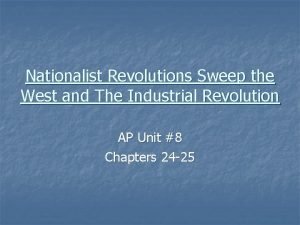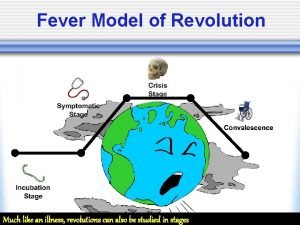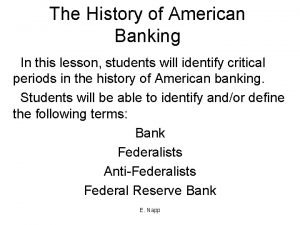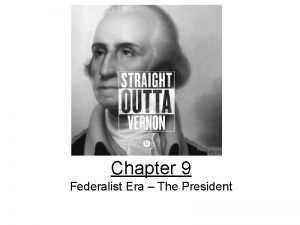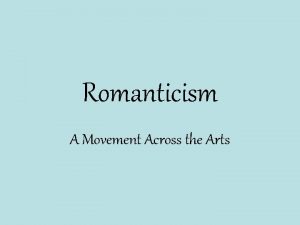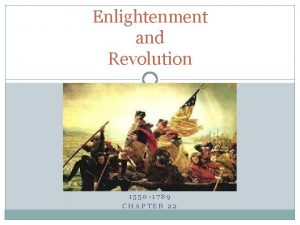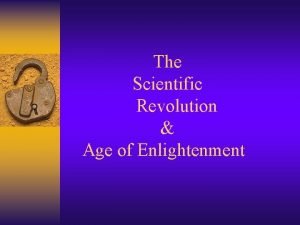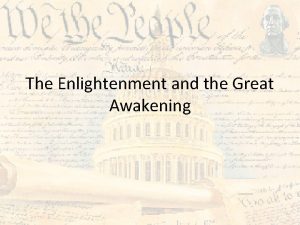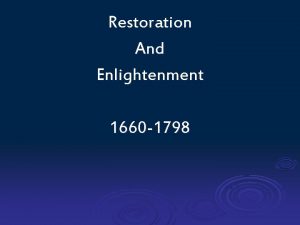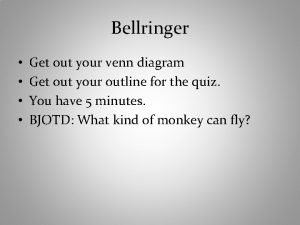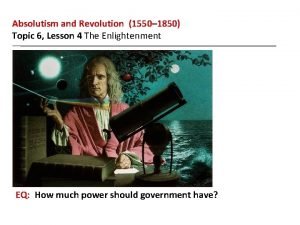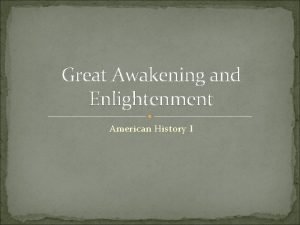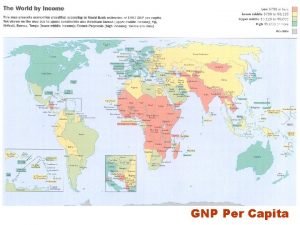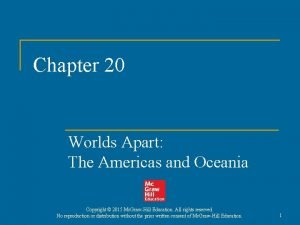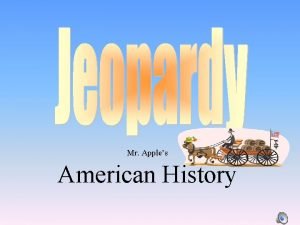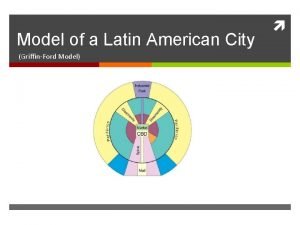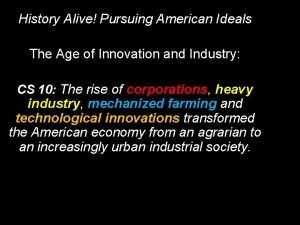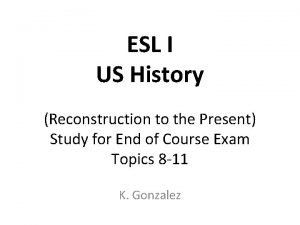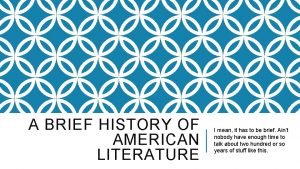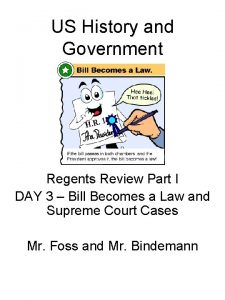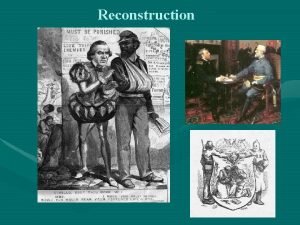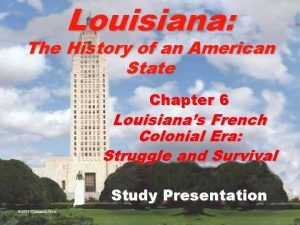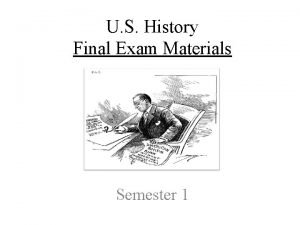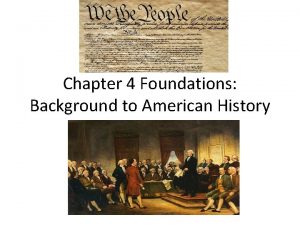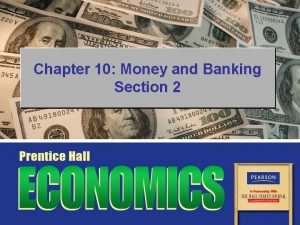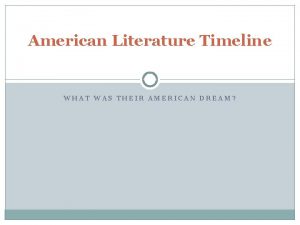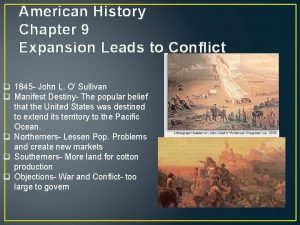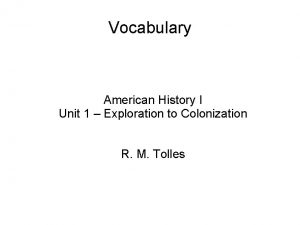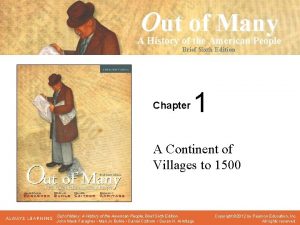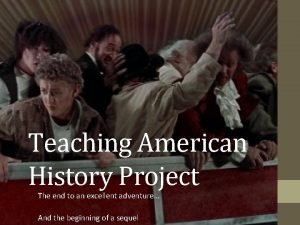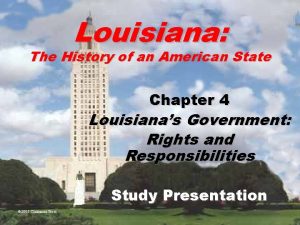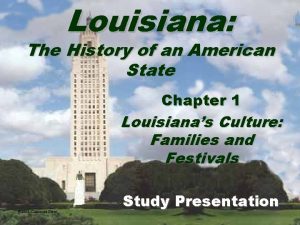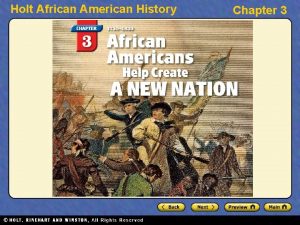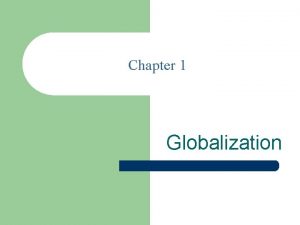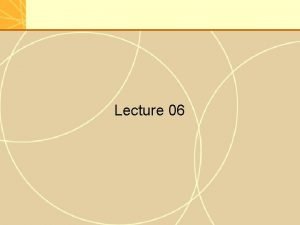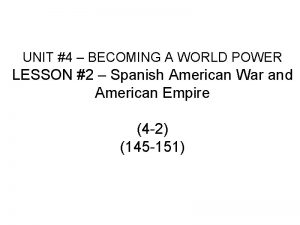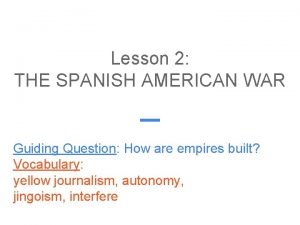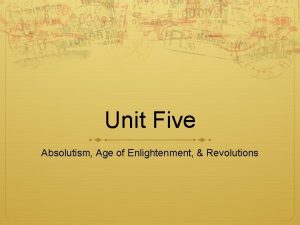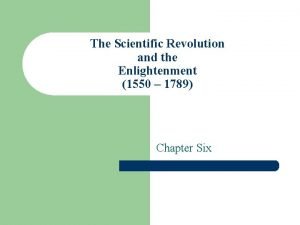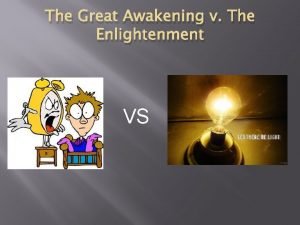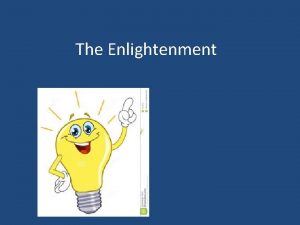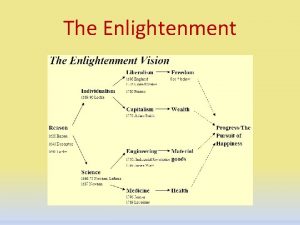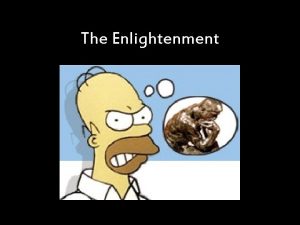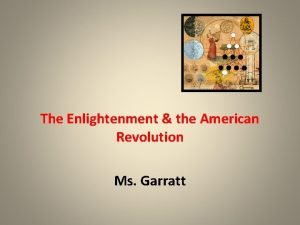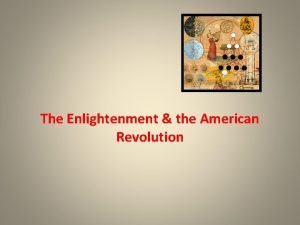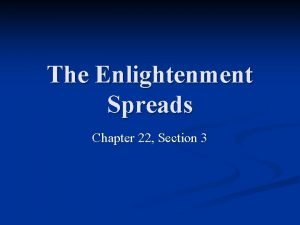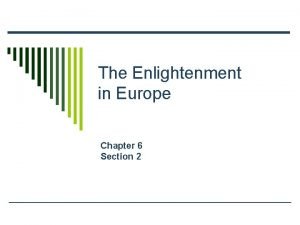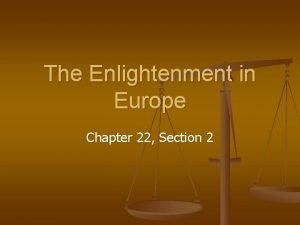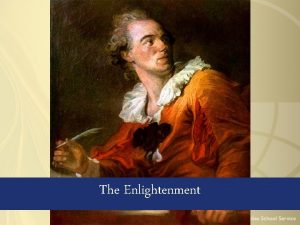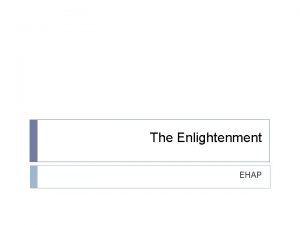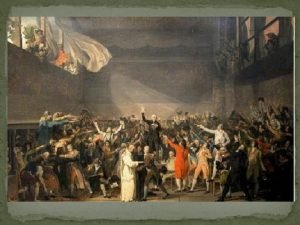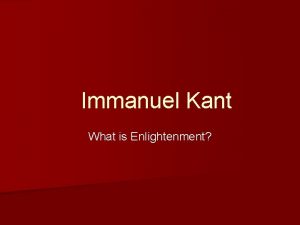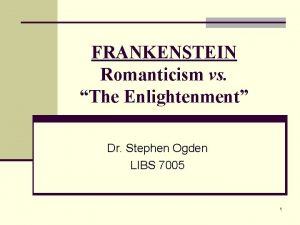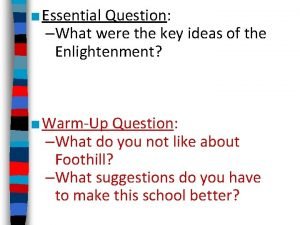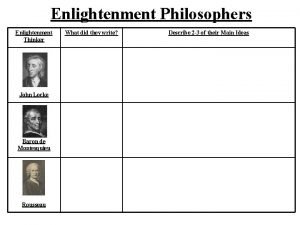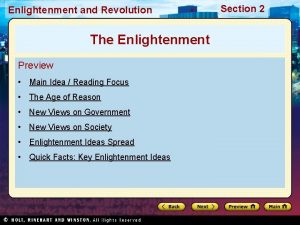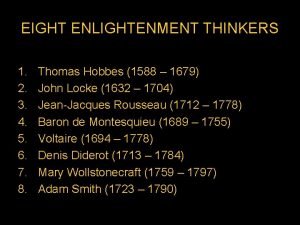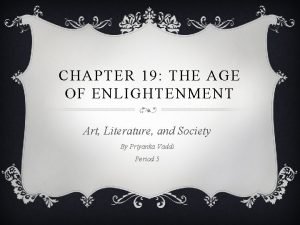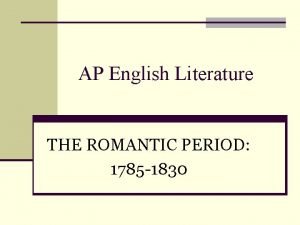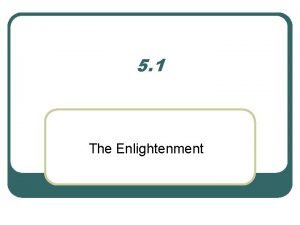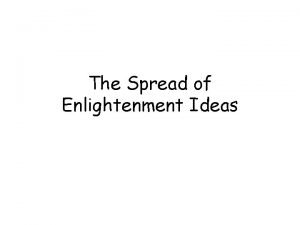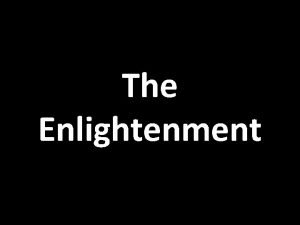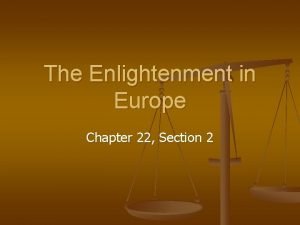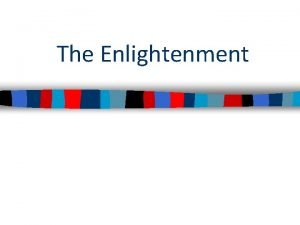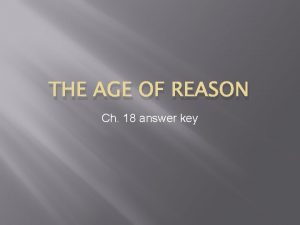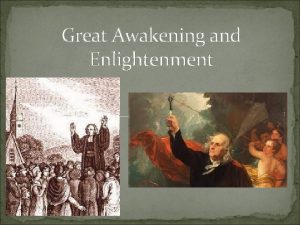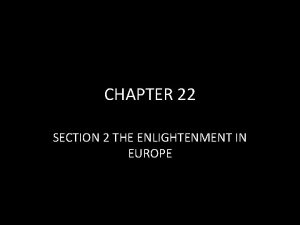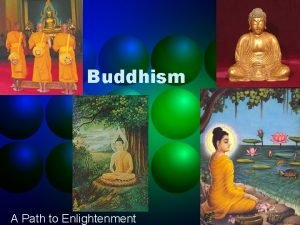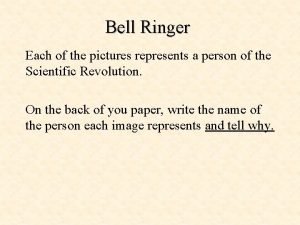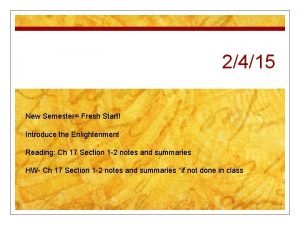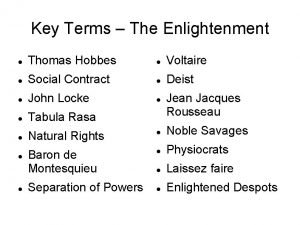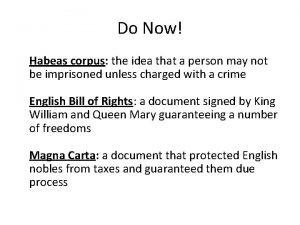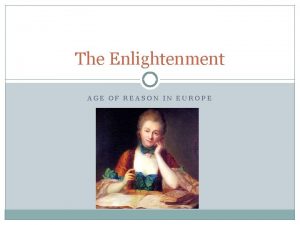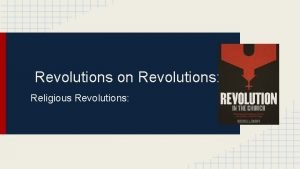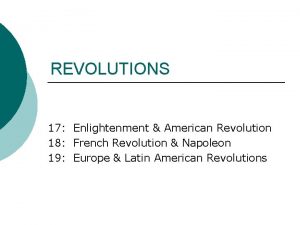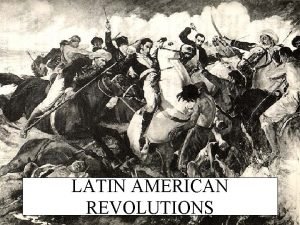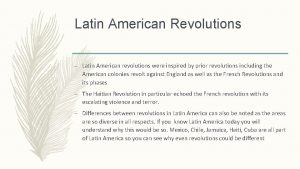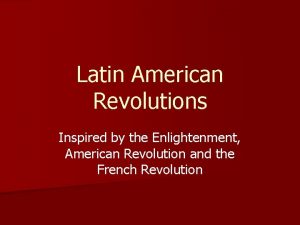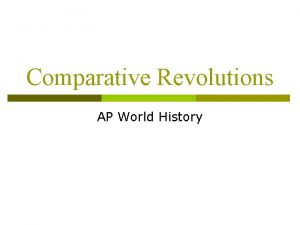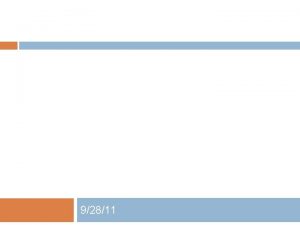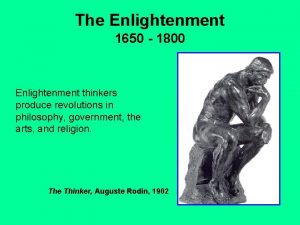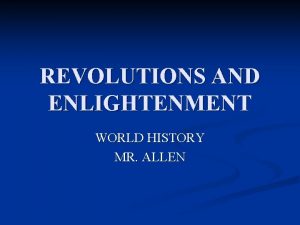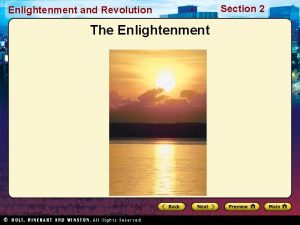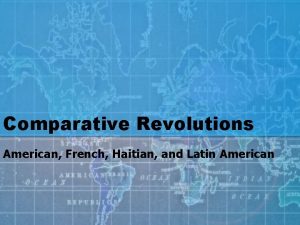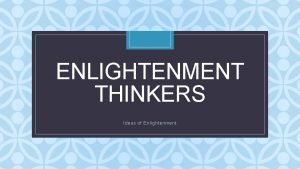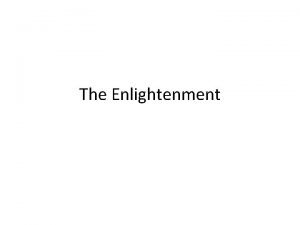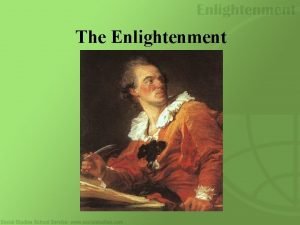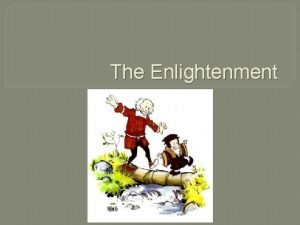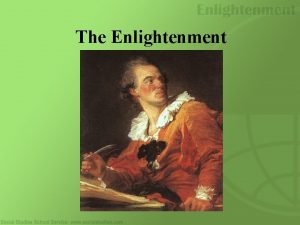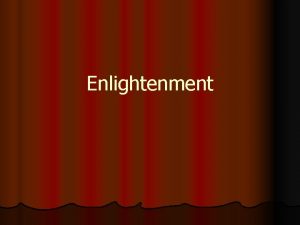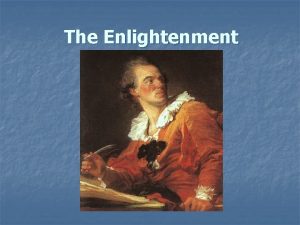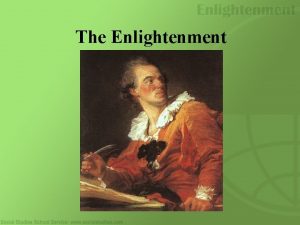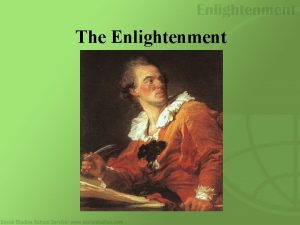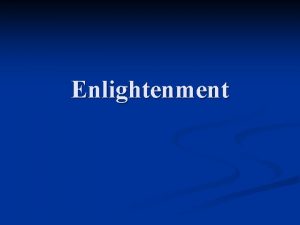World History The Enlightenment Revolutions American French and






























































































































































































- Slides: 190

World History The Enlightenment, Revolutions (American & French), and the Scientific Revolution Enlightenment ideas lead to: • Enlightenment scientists and philosophers produced revolutions in science, the arts, government, and religion. • New ideas led to the American Revolution in 17761789 and will inspire the French Revolution from 1789 -1795. 1 Copyright © by Houghton Mifflin Harcourt Publishing Company

World History What effects did the Enlightenment philosophers have on government and society? • The spread of Enlightenment philosophers’ ideas sparked changes in governments and society throughout Europe. • Encouraged by ideas such as natural law and social contracts, people challenged the structure of governments and society in existence since the Middle Ages.

World History

World History Enlightenment Thinkers A revolution in intellectual activity changed Europeans’ view of government and society. Democracy continues to be extended to more and more groups of people even into today. Ideas of democracy come NOT only from Classical Civilizations like Greece and Rome, even though it was an uneven democracy but they come from Enlightened Philosophers during the age of the Renaissance and Reformation. Two Views on Government • Scientific Revolution spurs reassessment of many prevailing ideas - Europeans seek insights into society during 1600 s, 1700 s • Leads to the Enlightenment—a movement stressing reason and thought (Copy this definition!!!) 4 Copyright © by Houghton Mifflin Harcourt Publishing Company

World History By the early 1700 s, European thinkers felt that nothing was beyond the reach of the human mind. The discoveries of the Scientific Revolution of the 1500 s and 1600 s convinced educated Europeans of the power of human reason. Natural law governed forces such as gravity and magnetism.

World History Could human reason be used to better understand social, economic, and political problems? • The approach of observation and experimentation had been used to understand natural forces such as gravity and magnetism. • In this way, the Scientific Revolution led to a new revolution in thinking, known as the Enlightenment. • Can humans and philosophers use observation and experimentation the same way that it had been used discovering the natural world to understand humanity? Philosophers and thinkers thought in more secular ways than in spiritual ways thereby using science in an attempt to explain human behavior in natural terms.

World History Draw a “T” Chart and label the left Hobbes and the right Locke to take notes. Two English thinkers, Thomas Hobbes and John Locke, used reason to examine social structures. They came to very different conclusions. Thomas Hobbes wrote Leviathan. Favored absolute monarchy. People formed social contracts because only a powerful government can ensure social order. John Locke wrote Two Treatises of Government. Favored limited government. Only governments with limited power, which are accepted by all citizens, protected the natural rights of the people.

World History Enlightenment Thinkers Hobbes’s Social Contract • Hobbes distrusts humans, he favors strong government to keep order • He promotes the idea of a social contract—getting order by giving power to monarch • A social contract is a verbal or written agreement between a monarch or king and its nobles or vassals (as in a feudal contract of loyalty) 8

World History Hobbs on the Need for Government • Thomas Hobbes claimed that without government, human beings would compete for territory, resources, and power. • Fighting would be common, and survival would depend on strength and cunning. • Government can make it possible for people to live together peacefully and productively. Click the mouse button or press the Space Bar to display the information.

World History What are the functions of government? You will learn this in your 12 th grade Government class.

World History The Need for Government ØGovernment – ruling authority for a community that can make or enforce laws. ØThomas Hobbs: Said that “people would compete for territory, resources, and power” and without a government they would be more likely to be “solitary, poor, nasty, brutish, and short. ”

World History The Need for Government according to Hobbs Ø“Survival of the fittest” OR “dog eat dog world” ØHow can government ensure that we can live together without hurting each other? ØIs the goal in The Preamble, – “to establish justice” an attempt by our government to carry out our most specific purpose? If so, what are some of the ways that they can establish justice? ØRemember Greek Democracy? (Not so democratic looking through today’s lenses. )

World History Two Views on Government Locke’s Natural Rights • Philosopher John Locke says government gets power from the people (Consent of the Governed through a social contract) • Locke stresses that people have a right to overthrow or to replace any unjust government 13 Copyright © by Houghton Mifflin Harcourt Publishing Company

World History John Locke (1632 – 1704)

World History John Locke Beliefs • People are born without innate ideas. (Tabular Rasa or “blank slate”) Knowledge is determined by experience or perception. • Property is a natural right derived from ones labor, work, and effort. • He believed in “Popular Sovereignty” or people have a right to rule. (Voting) • Revolution is not only a right but an obligation of violating a social contract if government becomes unjust.

World History Locke’s Beliefs People have certain natural rights and duties. These include: • Liberty • Life • Ownership of property The task of any state is to protect people’s rights which is one side of the social contract. The other side is for citizens to follow laws of a just and fair government. ) Social Contract – “Government can be inconvenient…” BUT, it should protect human rights better than individuals can on their own. If Government did not protect the people, people had a right and an obligation to find new rulers or leaders.

World History Locke’s Quotes John Locke Quotes • “All mankind. . . being all equal and independent, no one ought to harm another in his life, health, liberty or possessions. ” • “All wealth is the product of labor. ” • “Every man has a property in his own person. This nobody has a right to, but himself. ” • “Government has no other end, but the preservation of property. ”

World History In France, the philosophes applied the methods of science to understand society. Diderot • Voltaire • Montesquieu Rousseau Edited and published the Encyclopedia to “change the general way of thinking” Defended freedom of thought through his writings • Published The Spirit of Laws • Advocated the idea of separation of powers in government • Wrote The Social Contract • Promoted the idea that people in their natural state were essentially good

World History The French government and Catholic Church opposed the ideas of the philosophes. Voltaire was imprisoned and forced into exile. His books were banned. Still, he continued to defend freedom of speech. “My trade is to say what I think. ” —Voltaire

World History Who were the Philosophes? The Philosophe Who Advocates Radicalism • The philosophes are French social critics in the mid-1700 s • Value reason, nature, happiness, progress, liberty Philosophe #1: Voltaire Combats Intolerance • François Voltaire—influential philosophe, pen name of François Marie Arouet • Publishes many works arguing for tolerance, reason • Makes powerful enemies in the French Monarchy and Nobility and is imprisoned twice for his views 20 Copyright © by Houghton Mifflin Harcourt Publishing Company

World History Francois Voltaire (1694 -1778) Pen Pal to Fredrick the Great of Prussia.

World History Voltaire’s Beliefs • Admired John Locke and British government for development of peaceful transfer of power during the Glorious Revolution • Felt that the French aristocracy was corrupt (Estates and inequality) • Believed in the right of freedom of expression (speech) • Believed in Separation of Church and State and the corruptible influence on each other • He distrusted democracy because of ignorance of the commoners. He was a bit of an elitist. • He felt that monarchs should rule only if they enlightened by philosophers like himself. • He believed in “Freedom of Speech” which eventually got him jailed. by the King of France which he condemned for corruption.

World History Voltaire’s Beliefs, Continued… • The universe is based on reason and a respect for nature and natural law and not spiritual law. • Enlightened despotism (educated and empathetic dictator) is the key for progress • He fought for the right of a fair trial and freedom of religion, as well as free speech and was imprisoned by the French Crown.

World History Voltaire’s Quotes • "In general, the art of government consists in taking as much money as possible from one class of citizens to give to the other. " • “I would rather obey one lion, than 200 rats of [my own] species. ” • “I do not agree with what you say, but I will defend to the death your right to say it. ” • “It is dangerous to be right in matters on which the established authorities are wrong. ” • “There has never been a perfect government, because men have passions and if they did not have passions, there would be no need for government. ”

World History The Philosophes Who Advocate Reason Montesquieu and the Separation of Powers • Baron de Montesquieu—French writer who admires Britain’s government system • He favors separation of powers to keep one body from running government and becoming too powerful. Rousseau: Champion of Individual Freedom • Jacques Rousseau—philosophe who favors individual freedom and direct democracy like Athenian democracy • He views a social contract as an agreement by free people to form government and all citizens accept the chosen government. 25

World History Charles de Montesquieu (1689 -1755)

World History Philosophe #2: Baron Charles de Montesquieu’s Beliefs • Separation of Powers into 3 branches to check and stop the power of each other 1. Legislative 2. Executive 3. Judicial • Liberty and respect for properly constituted laws could co-exist together if each was respected. • He admired the British political system (17291731)

World History Montesquieu’s Beliefs • Laws underlie all things – human, natural, and divine laws. • He says there are 3 basic types of government: 1. Monarchy – limited power placed on king/queen 2. Republican like Rome with a Senate and emperor elected by the people: • Aristocratic Republic– a few had power (land owning Greeks like Athens in a direct democracy) • Democratic Republic– all citizens had power (land owning Senators who represented the citizens with an elected emperor) 3. Despot – controlled by a tyrant with absolute authority • Supported freedom (#1 & #2) and opposed tyranny (#3)

World History Montesquieu’s Quotes • “An empire founded by war has to maintain itself by war. ” • “Countries are well cultivated, not as they are fertile, but as they are free. ” • “In the infancy of societies, the chiefs of state shape its institutions; later the institutions shape the chiefs of state. ” • “Liberty is the right to do what the law permits. ” • “Luxury ruins republics; poverty ruins monarchies. ”

World History Jean-Jacques Rousseau (1712 -1778)

World History Philosophe #3: Jean Jacque Rousseau’s Beliefs • Society and pursuit of power and private property are what causes inequality and oppression. • He believed that people are not naturally social. • People who live in natural, isolated condition with no language are kind and have no motive/impulse to hurt one another (primitive civilizations) He was a bit of an idealist. • He felt society and expectations is causes people to become evil. • Laws should express the general will of the people. • Any government was only legitimate if it was by common consent. (Like Locke’s Popular Sovereignty = People rule and rule over their own individuality. )

World History Jean Jacques Rousseau’s beliefs, continued… • State of nature was primitive without law or morality (survival of the fittest and similar to Hobbs) • Humans if left in the state of nature will benefit from cooperation (civilized, socialism, and duty to community) • The division of labor and property ownership required the adoption of government to keep things equal. • Sovereignty should be in the hands of the people. • Sovereignty is the rule of law ideally decided by direct democracy in an assembly.

World History Rousseau’s Quotes • “Never exceed your rights, and they will soon become unlimited. ” • “Man is born free, but everywhere he is in chains. ” • “To renounce liberty is to renounce being a man. . For he who renounces everything, no indemnity is possible. Such a renunciation is incompatible with man's nature…”

World History Rousseau’s Quotes • “Never exceed your rights, and they will soon become unlimited. ” • “Man is born free, but everywhere he is in chains. ” • “To renounce liberty is to renounce being a man. . For he who renounces everything, no indemnity is possible. Such a renunciation is incompatible with man's nature…” • “Force does not constitute right…obedience is due only to legitimate powers. ”

World History The Enlightenment Spreads Enlightenment ideas spread through the Western world and profoundly influenced the arts and the development of government. 35

World History Ideas spread through salons as well as books and pamphlets. Gathering Places for discussion mostly by women In the 1600 s, a group of noblewomen in Paris began inviting a few friends to their homes for poetry readings. • By the 1700 s, some middle-class women began holding salons as well. • The most respected salons hosted writers and musicians such as Diderot and Mozart.

World History LESSON 3 The Enlightenment Spreads A World of Ideas • Paris becomes center of the Enlightenment during 1700 s • City is home to salons—gatherings where thinkers discuss ideas Philosophe #4 - Diderot’s Encyclopedia • Philosophe Denis Diderot begins publishing Encyclopedia in 1751. - set of books to which Enlightenment thinkers contribute essays • Encyclopedia articles anger French government and Catholic Church • Encyclopedia helps spread Enlightenment ideas across Europe 37 Copyright © by Houghton Mifflin Harcourt Publishing Company

World History

World History Most government and church authorities felt they had a sacred duty to defend the old order of divine-right rule and strict social classes. (Reactionary!) The most common defense was through censorship of writers and books. Writers fought back by disguising their ideas in fiction. Voltaire’s Candide exposed corruption and hypocrisy. Jonathan Swift’s Gulliver’s Travels satirized eighteenthcentury England. Montesquieu’s Persian Letters mocked French society.

World History

World History

World History In philosophy, Leibniz is most noted for his optimism, i. e. his conclusion that our Universe is, in a restricted sense, the best possible one hat God could have created, an idea that was often lampooned by others such as Voltaire.

World History

World History

World History

World History

World History From France, the heart of the Enlightenment, ideas spread across Europe and beyond. These new ideas created challenges to the rulers of the day. More people came to believe that reform was necessary to achieve a just society.

World History Absolute monarchs who adopted or accepted Enlightenment ideas were known as enlightened despots. Monarchs who applied enlightened ideas to their governments included • Frederick the Great of Prussia • Joseph II of Austria • Catherine the Great of Russia

World History Lesson 3 Enlightenment and Monarchy • Spirit of the Enlightenment prompts rise of enlightened despots: - monarchs who embrace Enlightenment values to strengthen their rule Frederick the Great • Frederick II, king of Prussia, reforms education and justice system • Grants religious freedom, abolishes torture, fails to end serfdom Joseph II • Joseph II of Austria allows freedoms of worship and the press • Abolishes serfdom, but the practice is reinstated after his death 49 Copyright © by Houghton Mifflin Harcourt Publishing Company Continued…

World History Lesson 3 Enlightenment and Monarchy Catherine the Great • Catherine the Great—enlightened ruler of Russia, 1762– 1796 • Seeks to abolish capital punishment and torture, but effort fails • Responds to peasant revolt by giving nobles more power over serfs Catherine Expands Russia • In foreign affairs, Catherine successfully expands Russian empire • Gains port access for Russia by seizing northern coast of Black Sea • Seizes large parts of Poland, increasing empire’s size 50 Copyright © by Houghton Mifflin Harcourt Publishing Company

World History The ideas of the philosophes convinced some rulers that reform was necessary. Frederick the Great (Prussia) • Reduced use of torture • Allowed a free press • Tolerated religious differences Catherine the Great (Russia) • Abolished torture • Established religious tolerance • Granted nobles a charter of rights • Criticized the institution of serfdom Joseph II (Austria) • Modernized Austria’s government • Supported religious equality for Jews and Protestants • Ended censorship • Abolished serfdom

World History Although these rulers implemented reforms, they would not give up their own power. • Frederick the Great desired a stronger monarchy and more power for himself. • Catherine the Great refused to give up power and aggressively expanded the Russian empire. • Joseph II implemented many changes, but most were canceled after his death.

World History Lesson 3 Legacy of the Enlightenment • The philosophes are not activists, but inspire major revolutions Belief in Progress • Scientific breakthroughs show human capacity to improve society A More Secular Outlook • New knowledge of the world leads people to question religious ideas • Voltaire and others criticize beliefs and practices of Christianity 53 Copyright © by Houghton Mifflin Harcourt Publishing Company Continued…

World History Lesson 3 Legacy of the Enlightenment Importance of the Individual • People place more emphasis on individual rights, abilities • Human reason becomes a central concept for philosophers, rulers 54 Copyright © by Houghton Mifflin Harcourt Publishing Company

World History Most Europeans’ lives were untouched by the Enlightenment and new cultural movements. • The majority remained peasants in small rural villages. • By the late 1700 s, though, ideas about equality and social justice reached peasant villages. • These ideas sowed the seeds for the political upheaval of the 1800 s.

World History How did the ideas of the Enlightenment lead to the independence and founding of the United States of America? The ideas of the Enlightenment had spread to the American colonies. The leaders of the American Revolution were profoundly influenced by these ideas and used them to create the structure of the government of the United States.

World History LESSON 4 The American Revolution Enlightenment ideals helped spur the American colonies to shed British rule and create a new nation. 57 Copyright © by Houghton Mifflin Harcourt Publishing Company

World History By the 1700 s, Britain was a global power. • It had greater ability to trade due to its location and colonies and imposed fewer restrictions on trade than other nations. • It had won previous European conflicts. • It held a monopoly on the slave trade in Spanish America. • England took control of Ireland in the 1600 s. It joined with Scotland Wales in 1707 to create the United Kingdom of Great Britain.

World History George III began a 60 -year reign as king of England in 1760. Although enlightened, George’s goal for his reign was to reassert royal power. He wanted to: • End Whig domination • Choose his own ministers • Dissolve the cabinet system • Make Parliament follow his will

World History • A string of prosperous British colonies stretched across the eastern coast of North America. • Colonial cities linked North America to the West Indies, Africa, and Europe. • The colonies were home to diverse religious and ethnic groups. Social distinctions were more blurred than in Europe, and political discussion was much freer.

World History LESSON 4 The American Revolution Britain and Its American Colonies • American colonies grow large and populous during 1600 s, 1700 s • Colonies thrive economically through trade with Europe - Britain’s Navigation Act restricts that trade (1651) - other trade laws add restrictions, taxes • Colonists identify less and less as British subjects 61 Copyright © by Houghton Mifflin Harcourt Publishing Company

World History Lesson 4 Americans Win Independence • Britain, American colonies win French and Indian War in 1763 • Britain taxes colonists to help pay war debts • Colonists argue that British cannot tax them without their consent Growing Hostility Leads to War • Colonists protest tea tax with “Boston Tea Party” in 1773 • Colonists meet in Philadelphia to address British policies (1774) • British and Americans exchange fire at Lexington and Concord in 1775 Continued… 62 Copyright © by Houghton Mifflin Harcourt Publishing Company

World History Violent clashes broke out in the colonies. 1770 – Boston Massacre 1773 – Boston Tea Party • Parliament passed harsh laws to punish Massachusetts for the destruction of the tea. Other colonies rallied to support Massachusetts. • Representatives from each colony gathered in Philadelphia and met in a Continental Congress to decide what action to take.

World History After much debate, American colonists declared their independence. • In April 1775, war between the colonists and British broke out. • Congress formed the Continental Army with George Washington in command. • In July 1776, the Continental Congress declared independence from Britain.

World History At the beginning of the war, the Americans were severely disadvantaged. British Huge fleet Large number of trained soldiers • Greater resources • • Americans Few military resources Little money to pay soldiers • No strategic plan • •

World History George Washington and his army used the few advantages they had. • A familiar terrain • Strong leadership • The fierce determination of the rebels to fight for their ideals of liberty

World History Lesson 4 Americans Win Independence The Influence of the Enlightenment • Colonial leaders push for independence, rely on Enlightenment ideas • Declaration of Independence—document justifying colonial rebellion • Leader Thomas Jefferson writes Declaration, uses ideas of Locke Success for the Colonists • Despite British military might, colonists have advantages: - motivating cause of freedom - French assistance - war’s expense for Britain • British surrender at Yorktown in 1781; colonists win the war 67 Copyright © by Houghton Mifflin Harcourt Publishing Company

World History Thomas Jefferson By working to get the Bill of Rights passed in 1789, James Madison continued his support of Jefferson's policies. Jefferson supported the Constitution under the condition that basic human rights would be protected through a series of amendments. He was also the author of the first draft of the Declaration of Independence in 1776 and based it on Locke’s Natural Rights. • Life, • Liberty, • and the Pursuit of Happiness

World History The Declaration of Independence was inspired by the ideas of John Locke and principally written by Thomas Jefferson. • Government had an obligation to protect the people’s natural rights. • People had the right to “alter or to abolish” unjust governments. • Clearly stated the principle of popular sovereignty, that all government power comes from the people. “We hold these truths to be selfevident, that all men are created equal, that they are endowed by their Creator with certain inalienable Rights, that among these are Life, Liberty, and the pursuit of Happiness. ” —Declaration of Independence

World History Most importantly, the Americans needed an alliance of foreign support to obtain supplies, trained soldiers, and warships. After the American victory in the Battle of Saratoga in 1777, France was persuaded to join the Americans against the British. Once France joined the American side, Spain and the Netherlands followed.

World History In 1781, the French fleet blockaded Chesapeake Bay, creating a decisive victory for the Americans at Yorktown, Virginia. The war was ended in 1783 with the signing of the Treaty of Paris. Britain recognized the independence of the United States of America.

World History Lesson 4 Americans Create a Republic • The 13 states recognized the need for a national government • Wanted states to retain power • Feared establishing a democracy A Weak National Government • Articles of Confederation set government plan for new republic • Articles create legislature only, no executive or judicial branches • Result is weak national government fails to provide unity and order A New Constitution • Leaders call Constitutional Convention in 1787 to revise articles • Group instead creates a new government under U. S. Constitution • Constitution contains many political ideas of the Enlightenment 72 Copyright © by Houghton Mifflin Harcourt Publishing Company Continued…

World History The first constitution of the United States was known as the Articles of Confederation. • This ultimately proved too weak to rule the diverse states effectively and created a failed system of government based on a loose agreement between the newly created 13 states. • This led to the creation of a Constitutional Convention in 1787. • George Washington, James Madison, and Benjamin Franklin, among others, gathered to redraft the articles of a new constitution.

World History Ratification The Debate over Ratification The debate polarized the new nation. Those who supported the Constitution became known as FEDERALISTS and those who opposed its ratification were called ANTIFEDERALISTS. The federalists supported a strong national government to preserve order. The antifederalists favored strong state governments and believed that the national government created by the Constitution was too strong. They demanded a list of rights be added to the Constitution which would eventually become known as the Bill of Rights or the First 10 Amendments.

World History Political Beliefs Who Should Rule federalists Believed the Union would fail without a strong central government Thought that elites were most fit to govern antifederalists Wanted strong state governments (closer to the people) Believed that ordinary people should have great input into government Distrusted elites; thought they were corrupt Trusting the People Distrusted rule by the people Who were they? Property owners, landed Small farmers, wealthy, well-to-do shopkeepers, laborers, merchants

World History The Constitution of the United States created a federal republic rather than a confederation with power divided between the national government and the states. (Federalism) • Government was a social contract with a system of checks and balances. • The president and the legislature were to be elected. • Our first president, George Washington, set a precedent of a two term limit even though the Constitution never prevented him from more terms. • There would be a separation of powers among legislative, executive, and judicial branches with checks and balances to prevent one branch from getting to much power of the other branches.

World History Lesson 4 Americans Create a Republic The Federal System • Constitution creates three branches of government • Provides checks and balances—ensures branches share power equally • Promotes federal system—power divided between nation and states The Bill of Rights • Some fear too much national power, few protections of rights • Leaders win support for Constitution by adding a Bill of Rights - ten amendments to Constitution that protect freedoms 77 Copyright © by Houghton Mifflin Harcourt Publishing Company

World History The first ten amendments to the Constitution were known as the Bill of Rights. They stated that citizens had basic rights that the government was required to protect. Among the 1 st, 2 nd, & 5 th Amendments were these rights: • Freedom of religion, speech, press, assembly, and petition. • Right to bear arms • Right to due process of law • And others!!!

World History The Rising Sun Armchair (George Washington's Chair) Rising Sun Armchair that Washington sat in during the Convention in Philadelphia in 1787. http: //www. let. rug. nl/usa/outlines/government-1991/topics/benjamin-franklins-rising-sun. php

World History "I have often. . . in the course of the session. . . looked at that sun behind the President without being able to tell whether it was rising or setting. But now at length I have the happiness to know it is a rising and not a setting sun. “ Ben Franklin

World History Adopted in 1789, the Constitution became a symbol of freedom to European and Latin American reformers. • The leaders of the American Revolution were inspired by the ideas and philosophers who spread new ways of thinking during the Age of Enlightenment as opposed by the Dark or Middle Ages. • The success of the American Revolution influenced the revolutions to come in France known as the French Revolution in 1789 and in Latin America and much of Europe in the 1800 s and will continue even until today.

World History The French Revolution and Napoleon The French Revolution established a new political order, Napoleon Bonaparte gained and lost an empire, and European states forged a balance of power. 82 Copyright © by Houghton Mifflin Harcourt Publishing Company

World History The French Revolution and Napoleon ESSENTIAL QUESTION How did the French Revolution change the balance of power in Europe? LESSON 1 The French Revolution Begins LESSON 2 Revolution Brings Reform and Terror LESSON 3 Napoleon’s Empire 83 Copyright © by Houghton Mifflin Harcourt Publishing Company

World History LESSON 1 The French Revolution Begins Economic and social inequalities in the Old Regime helped cause the French Revolution. 84 Copyright © by Houghton Mifflin Harcourt Publishing Company

World History

World History

World History Congressional factions in the most current Congress not including Party Democrats NOR Party Republicans • The Congressional Progressive Caucus (CPC) is a membership organization within the Democratic congressional caucus in the United States Congress. The CPC is a left-leaning organization that works to advance progressive and liberal issues and positions and represents the progressive faction of the democratic party. (69) • The Freedom Caucus, also known as the House Freedom Caucus, is a congressional caucus consisting of conservative and libertarian Republican members of the United States House of Representatives. . The caucus is sympathetic to the Tea Party movement. (33) • The Blue Dog Coalition, commonly known as the Blue Dogs or Blue Dog Democrats, is a caucus of United States Congressional Representatives from the Democratic Party who identify as conservative Democrats. . The 115 th Congress has seen the Coalition grow to 18 members from the original 11 members since the 2016 election. (18) • The Tuesday Group is an informal caucus of 48 moderate Republican members of the United States House of Representatives in the 115 th Congress.

World History

World History LESSON 1 The French Revolution Begins The Old Order • Old Regime—social and political system in France during the 1770 s • Estates—three social classes of France’s Old Regime The Privileged Estates • First Estate—Catholic clergy—own 10 percent land, pay few taxes • Second Estate—rich nobles— 2 percent population, own 20 percent land The Third Estate • 97 percent of people are peasants, urban workers, middle class • Have few privileges, pay heavy taxes, want change 89 Copyright © by Houghton Mifflin Harcourt Publishing Company

World History And, now back to France and Factions!!!

World History Lesson 1 The Forces of Change Enlightenment Ideas • Enlightenment ideas inspire some in Third Estate Economic Troubles • High taxes and rising costs damage economy by 1780 s • King Louis XVI and his wife Marie Antoinette known for extravagance • Louis doubles nation’s debt; banks refuse to lend more money A Weak Leader • Louis’s poor decisions and lack of patience add to France’s problems • He calls Estates-General—meeting of representatives from all three estates 91 Copyright © by Houghton Mifflin Harcourt Publishing Company

World History Lesson 1 Dawn of the Revolution The National Assembly • Third Estate has little power under old rules • Sieyès persuades them to make major changes in French government • Third Estate sets up National Assembly—new legislature to make reforms • Tennis Court Oath—delegates decide to write new constitution for France Storming the Bastille • Rumors fly in Paris that Louis wants to suppress National Assembly • Mob attacks and seizes Bastille, killing guards on July 14, 1789 92 Copyright © by Houghton Mifflin Harcourt Publishing Company

World History Lesson 1 A Great Fear Sweeps France • Rumors and panic spread throughout France • Great Fear—attacks by peasants taking place across France • Peasants destroy legal papers binding them to feudal system • In October 1789, Parisian women revolt over rising price of bread • They demand action, forcing Louis to return from Versailles to Paris 93 Copyright © by Houghton Mifflin Harcourt Publishing Company

World History What led to the storming of the Bastille, and therefore, to the start of the French Revolution? A volatile atmosphere in France resulted from a widespread famine and the influence of reformers inspired by Enlightenment ideas. The situation exploded on July 14, 1789.

World History In 1789, France’s society was based on a system created in the Middle Ages. The ancien régime separated everyone in French society into one of three estates: First Estate Second Estate Third Estate Clergy Nobility About 95 percent of the population, including the bourgeoisie, urban workers, and rural peasants

World History The first two estates enjoyed most of the wealth and privileges of France. The Church • Owned 10 percent of the land • Collected tithes • Paid no direct taxes to the state The nobility • Had right to top jobs in government, the army, the courts, and the Church • Paid no taxes Boujee is an abbreviation of the French masculine and feminine terms" bourgeois" and "bourgeoise, " traditionally used to describe the Marie Antoinette-like materialistic and pleasure-seeking attitudes of the affluent middle to upper middle class. The ladies that Migos are rapping of here are high-class with hedonistic values.

World History At all levels, members of the Third Estate had reason to resent the existing social order. • Even wealthy members of the bourgeoisie did not have access to the best government positions. • Urban workers earned pitiful wages and faced starvation whenever the price of bread rose. • Rural peasants owed fees and services that dated back to feudal times. As Enlightenment ideas spread among the Third Estate, many began to question the ancien régime.

World History Economic troubles added to the social unrest and heightened tensions. Years of deficit spending had put the government deeply in debt. The money had been spent on: • Louis XIV’s lavish court • the Seven Years’ War • support for Patriots in the American Revolution • rising costs of goods and services Bad harvests in the 1780 s made it harder to recoup this money.

World History To solve the financial crisis, the government had to increase taxes, reduce expenses, or both. The first two estates resisted any attempts to make them pay taxes. Louis XV ran up more debt. Louis XVI was weak but attempted some economic reforms.

World History Louis XVI appointed Jacques Necker as his financial advisor. Necker made recommendations to reduce the debt: • Reduce extravagant court spending • Reform government • Abolish tariffs on internal trade • Tax the First and Second Estates When Necker proposed taxing the First and Second Estates, the nobles and high clergy forced Louis XVI to dismiss him.

World History The pressure for reforms mounted, but the powerful classes demanded that the king summon a meeting of the Estates-General. The nobles hoped that the Estates. General could bring the absolute monarch under their control and guarantee their own privileges. • In the meantime, France was on the verge of bankruptcy. • Rising prices led to bread riots. • Nobles continued to fight against taxes.

World History Before the meeting, Louis had all the estates prepare cahiers listing their grievances. • Fairer taxes! • Freedom of the press! • Regular meetings of the Estates-General! Many delegates from the Third Estate wanted to solve the financial crisis, but insisted on reforms.

World History The voting system created a stalemate, because each estate traditionally met separately and had one vote. 1 vote First Estate Second Estate 1 vote Third Estate moved to create a fairer system in which the three estates met together and votes were counted by heads rather than estates.

World History In June 1789, after weeks of stalemate, members of the Third Estate declared themselves to be the National Assembly and the true representatives of the people. They were locked out of their meeting hall and moved to a nearby tennis court. The members of the National Assembly took the Tennis Court Oath. They pledged to continue meeting until a constitution was established.

World History Some reform-minded clergy and nobles joined the Third Estate in the National Assembly. Louis XVI was forced to accept the new body. But when royal troops gathered in Paris, rumors spread that the king planned to dissolve the National Assembly.

World History On July 14, 1789, events erupted into revolution with the storming of the Bastille. • A crowd gathered outside the prison to demand weapons they thought were stored there. • The commander fired on the crowd, killing many. The mob broke through, freeing prisoners but finding no weapons. • The fall of the Bastille challenged the existence of the ancien régime.

World History LESSON 2 Revolution Brings Reform and Terror The revolutionary government of France made reforms but also used terror and violence to retain power. 107 Copyright © by Houghton Mifflin Harcourt Publishing Company

World History LESSON 2 Revolution Brings Reform and Terror The Assembly Reforms France The Rights of Man • National Assembly adopts Declaration of the Rights of Man and of the Citizen • Revolutionary leaders use the slogan, “Liberty, Equality, Fraternity” A State-Controlled Church • National Assembly seizes church lands, turns clergy into public officials • This action alarms many peasants, who are devout Catholics 108 Copyright © by Houghton Mifflin Harcourt Publishing Company Continued…

World History Lesson 2 The Assembly Reforms France Louis Tries to Escape • Louis, worried about his future, attempts to escape France • Revolutionaries catch the royal family near Netherlands’ border 109 Copyright © by Houghton Mifflin Harcourt Publishing Company

World History Lesson 2 Divisions Develop A Limited Monarchy • In September 1791, Assembly finishes new constitution • Legislative Assembly—new body created to pass laws Factions Split France • Major problems, including debt, food shortages remain • Assembly split into Radicals, Moderates, Conservatives • Émigrés—nobles who flee country, want Old Regime back in power • Sans-culottes—lower class who want more change from the Revolution 110 Copyright © by Houghton Mifflin Harcourt Publishing Company

World History Lesson 2 War and Execution • Austrians and Prussians want Louis in charge of France; France declares war France at War • Prussian forces soon threaten to attack Paris • Parisian mob jails royal family, kills guards • Mob breaks into prisons, killing over 1, 000, including many who support king • Pressured by mob, Legislative Assembly deposes the king and then dissolves • National Convention takes office in September, forming French republic Continued… 111 Copyright © by Houghton Mifflin Harcourt Publishing Company

World History Lesson 2 War and Execution Jacobins Take Control • Jacobins—radical political organization behind 1792 governmental changes • After a close vote, Louis XVI is found guilty of treason and beheaded • Guillotine—machine designed during the Revolution to behead people The War Continues • French army wins great victory against Prussians and Austrians • In 1793 Britain, Spain, Holland join forces against France • National Convention orders draft of 300, 000 to reinforce army 112 Copyright © by Houghton Mifflin Harcourt Publishing Company

World History Lesson 2 The Terror Grips France • Not all people in France support all changes of the Revolution Robespierre Assumes Control • Maximilien Robespierre—Jacobin leader rules France for a year • Becomes leader of the Committee for Public Safety, a dictator • Reign of Terror—Robespierre’s rule, which includes killing many opponents • Thousands die during the Terror, including former allies and Marie Antoinette • 85 percent of those who die during the Terror are middle or lower class 113 Copyright © by Houghton Mifflin Harcourt Publishing Company

World History Lesson 2 End of the Terror • In September 1791, Assembly finishes new constitution • Legislative Assembly—new body created to pass laws • In July 1794, Robespierre arrested, executed • Terror results in public opinion shifting away from radicals • Moderate leaders write new constitution • Two-house legislature and five-man Directory restore order • New government makes Napoleon Bonaparte commander of armies 114 Copyright © by Houghton Mifflin Harcourt Publishing Company

World History What political and social reforms did the National Assembly institute in the first stage of the French Revolution? The members of the National Assembly voted to end their own privileges after the storming of the Bastille. From providing equal rights to all male citizens before the law, to the abolishment of their exclusion from taxes, the National Assembly aimed to change an unjust system.

World History Historians have divided the period of the French Revolution into four different phases. National • France became a constitutional Assembly monarchy Reign of Terror • Directory • A radical phase with escalating violence • End of the monarchy A period of reaction against extremism Age of • Consolidation of many changes Napoleon • A period of war throughout Europe

World History The political crisis of 1789 in France coincided with the worst famine in memory. • Rumors were rampant and created panic. • During the period known as the “Great Fear, ” peasants believed that government troops were seizing their crops. • Believing that nobles were trying to reinstate medieval dues, peasants stole grain and set fire to old manor records. • Although the violence died down, peasant anger against the ancient regime remained high.

World History In Paris, the revolutionary center of France, several factions competed for power. National Guard Moderate • Led by the Marquis de Lafayette • A mainly middle-class militia • Radical • Replaced the royalist Paris government of Paris Commune • Mobilized violent action for the revolution •

World History The National Assembly reacted to the uprisings and voted to end the privileges of the nobility. • Nobles gave up old manorial dues and exclusive hunting rights. • Nobles ended their special legal status and their exemptions from paying taxes. • The assembly enacted the equality of all male citizens before the law.

World History At the end of August, 1789, the National Assembly issued the Declaration of the Rights of Man and the Citizen. Modeled after the American Declaration of Independence, it announced • Free and equal rights for all men • Natural rights for all men • Equality before the law for all men • Freedom of religion for all citizens • Taxes levied fairly for all citizens

World History The Declaration of the Rights of Man did not please everyone. Women such as Olympe de Gouges called for equal citizenship for women. Louis XVI did not want to accept the reforms of the National Assembly.

World History Some 6, 000 women marched on Versailles on October 5, 1789. • They were angry about the famine resented Queen Marie Antoinette, who lived a life of luxury • They demanded to see the king. • The women brought the king and queen to Paris, where they lived as virtual prisoners.

World History The National Assembly placed the Church under state control. It dissolved convents and monasteries. It ended papal authority over the French Church. The Civil Constitution of the Clergy made bishops and priests elected, salaried officials. This move was condemned by the pope, many bishops and priests, and large numbers of French peasants.

World History The National Assembly produced the Constitution of 1791. This set up a limited monarchy. The new Legislative Assembly had the power to • Make laws • Collect taxes • Decide on issues of war and peace Moderate reformers considered that the Constitution of 1791 completed the French Revolution.

World History At the time of the creation of the Constitution of 1791, Louis XVI and Marie Antoinette attempted to escape France. To many, this attempt meant that Louis was a traitor to the revolution. The emperor of Austria and king of Prussia signed the Declaration of Pilnitz supporting Louis and threatening to intervene. As French émigrés spread fear of revolution in other nations, France prepared for war.

World History The sans-culottes and the Jacobins pushed the revolution to more radical action. • Sans-culottes demanded a republic and an end to monarchy. • Jacobins gained the upper hand in the Legislative Assembly and declared war on Austria, Prussia, Britain, and other states. • Fighting began in 1792 and lasted on and off until 1815. Sans-culottes

World History What events occurred during the radical phase of the French Revolution? Initially, the monarchy was abolished and a republic was established. War continued throughout Europe. After the radicals gained control, those who were against the revolution were subject to arrest or execution. Thousands, including the king and queen, were beheaded at the guillotine.

World History In 1792, the war abroad was going badly for the French. • Many revolutionaries believed that the king was in league with foreign powers to retain his power. • Citizens attacked the palace where the king was held. The king and his family escaped to the Legislative Assembly. • Citizens also attacked prisons that held nobles and priests. Tensions led to increasing violence.

World History Radicals took control of the Legislative Assembly and called for the election of a new legislative body —the National Convention • Extended suffrage to all male citizens. • Seized nobles’ lands. In addition, the monarchy was abolished in favor of the creation of a republic.

World History The National Convention put Louis XVI on trial as a traitor to France. He was sentenced to death. • In January 1793, Louis XVI was beheaded. • In October 1793, Marie Antoinette was beheaded.

World History By 1793, France faced external and internal threats. • War continued with the Netherlands, Spain, Britain, and Prussia. • Royalists and priests led rebellions against the government. • The sans-culottes demanded relief from food shortages and inflation. • The Convention was divided between the Jacobins and the Girondins. The Convention created the Committee of Public Safety to deal with these issues.

World History The National Convention granted the Committee of Public Safety absolute power to save the revolution. At war, French armies overran the Netherlands and invaded Italy. At home, France battled counterrevolutionaries through the use of terror.

World History Maximilien Robespierre became the leader of the Committee of Public Safety. He was a reformer, but also supported terror as a way to maintain order. Robespierre: • Promoted religious tolerance • Tried to abolish slavery • Arrested and tried all those who threatened the revolution Nearly 300, 000 people were arrested and 17, 000 executed by guillotine for opposing the revolution. The Reign of Terror continued until Robespierre himself was executed in 1794.

World History In reaction to the Reign of Terror, moderates produced the Constitution of 1795. The Constitution created a five-man Directory and a two-house legislature. The Directory: • Made peace with Prussia and Spain • Continued the war with Austria and Great Britain • Created a constitutional monarchy The Directory was corrupt and did not solve problems such as rising bread prices. They appointed Napoleon Bonaparte, a popular military hero, to rule France.

World History By 1799, France had changed dramatically from the country of Louis XVI and his court. • The term citizen applied to people of all social classes. • Elaborate fashions gave way to simple clothing. • Nationalism rose throughout France. Troops in Marseilles marched to a rousing song that would later become the French national anthem. • State schools replaced religious ones. • Social systems were organized to help the poor, old soldiers, and war widows.

World History LESSON 3 Napoleon’s Empire Napoleon Bonaparte, a military genius, seized power in France and made himself emperor. His conquests aroused nationalistic feelings across Europe and contributed to his downfall. 136 Copyright © by Houghton Mifflin Harcourt Publishing Company

World History LESSON 3 Napoleon’s Empire Napoleon Seizes Power • Napoleon Bonaparte—born in Corsica in 1769, attends military school, joins army Hero of the Hour • In 1795, Napoleon defeats royalist rebels attacking National Convention • Napoleon wins stunning victories in Italy, gaining popularity • News of his defeats in Egypt is suppressed Coup d’État • In November 1799, he carries out coup d’état—seizure of power • Napoleon defeats British, Russians, Austrians who join forces against him 137 Copyright © by Houghton Mifflin Harcourt Publishing Company

World History Lesson 3 Napoleon Rules France • New constitution is approved through plebiscite—vote of the people Restoring Order at Home • To fix economy, he sets up national banking system, efficient tax collection • Establishes lycées—government-run public schools to train officials • Signs concordat—agreement—with pope restoring Catholicism in France • Creates Napoleonic Code—uniform system of laws Napoleon Crowned as Emperor • In December 1804, Napoleon crowns himself emperor of France 138 Copyright © by Houghton Mifflin Harcourt Publishing Company

World History Lesson 3 Napoleon Creates and Empire Loss of American Territories • In 1801, Napoleon attempts to retake colony of Saint Domingue but fails • Gives up on the Americas and concentrates on Europe • Sells the Louisiana Territory to United States for $15 million in 1803 Conquering Europe • Britain, Russia, Austria, Sweden join forces against Napoleon • Napoleon crushes enemy forces in several brilliant battles • Napoleon forces Austria, Russia, Sweden to sign peace treaties 139 Copyright © by Houghton Mifflin Harcourt Publishing Company Continued…

World History Lesson 3 Napoleon Creates and Empire The Battle of Trafalgar • In 1805, British win Battle of Trafalgar—ensures British naval superiority • This defeat forces Napoleon to give up plan of invading Britain • Looks for another way to control Britain The French Empire • Napoleon controls Europe except for Britain, Portugal, Sweden, Ottomans • Has puppet rulers in some countries, alliances with others • French Empire reaches largest extent from 1807 to 1812 140 Copyright © by Houghton Mifflin Harcourt Publishing Company

World History Lesson 3 Napoleon’s Costly Mistakes The Continental System • Napoleon strikes Britain through blockade—forced closing of ports • Continental System—economic plan to strengthen Europe, weaken Britain • Smugglers and uncooperative allies make France’s blockade fail • Britain responds with blockade of its own, led by its stronger navy • Americans fight Britain in War of 1812; war does no major damage to Britain 141 Copyright © by Houghton Mifflin Harcourt Publishing Company Continued…

World History Lesson 3 Napoleon’s Costly Mistakes The Peninsular War • Napoleon sends troops across Spain to attack Portugal, causing protest • Napoleon makes his brother king of Spain, making things worse • Spanish fight as guerrillas using guerrilla warfare—small groups that attacked and then disappear • British aid Spanish guerrillas • Napoleon loses 300, 000 soldiers during this Peninsular War • Nationalist rebels fight the French in other conquered territories 142 Copyright © by Houghton Mifflin Harcourt Publishing Company Continued…

World History Lesson 3 Napoleon’s Costly Mistakes The Invasion of Russia • Relations with Russia break down, Napoleon decides to invade • In June 1812, Napoleon’s army marches into Russia with 420, 000 men • Russians use scorched-earth policy—destroying crops, livestock • In September 1812, Russians retreat from Moscow after Battle of Borodino • Napoleon finds Moscow abandoned and burning • Napoleon retreats, losing thousands of soldiers to raids, cold weather 143 Copyright © by Houghton Mifflin Harcourt Publishing Company

World History Lesson 3 Napoleon’s Downfall Napoleon Suffers Defeat • Britain, Prussia, Sweden, Russia, Austria join forces against Napoleon • Napoleon raises another army, but meets quick defeat by allied powers • Napoleon finally surrenders and is exiled to island of Elba The Hundred Days • Louis XVIII, new king, is soon overthrown and Napoleon returns from exile • Waterloo—British, Prussian forces defeat Napoleon’s army • This defeat ends Hundred Days—Napoleon’s last attempt at power 144 Copyright © by Houghton Mifflin Harcourt Publishing Company

World History The Congress of Vienna After exiling Napoleon, European leaders at the Congress of Vienna tried to restore order and reestablish peace. 145 Copyright © by Houghton Mifflin Harcourt Publishing Company

World History Political Changes Beyond Vienna Conservative Europe • Holy Alliance—Russia, Prussia, Austria pledge to fight revolution • Concert of Europe—European nations pledge to help fight revolutions • Conservative governments rule across Europe, but new ideas have impact Revolution in Latin America • Napoleon’s replacing king of Spain set off rebellions in Spanish America • Many former colonies of Spain and Portugal gain independence Long-Term Legacy • Britain, Prussia gain power; spreading nationalism leads to revolutions 146 Copyright © by Houghton Mifflin Harcourt Publishing Company

World History Explain Napoleon’s rise to power in Europe, his subsequent defeat, and how the outcome still affects Europe today. Napoleon rose to power in the midst of near-chaos in France. His successes on the battlefield along with his strong governmental control encouraged a French nationalism that brought Europe to its knees. Napoleon’s laws were spread throughout Europe during the expansion and remain important in many countries today.

World History Napoleon Bonaparte was a military hero who rose quickly through the army. He favored republican rule and the Jacobins. 1793 1798 1799 • Drove British forces from Toulon • Won victories against the Austrians • Captured most of northern Italy • Lost in Egypt, but hid news of his worst losses by censoring the press • Overthrew the Directory and set up a three-man governing board known as the Consulate

World History When Napoleon helped create the Consulate, he became First Consul. • In 1802, Napoleon became consul for life. • Two years later, he crowned himself Emperor of the French. • At each step, Napoleon had held a plebiscite and been strongly supported by the French people.

World History Napoleon restored order and prosperity and strengthened the central government. He: • Controlled prices His policies gained him support among all social classes. He: • Made peace with the Church • Encouraged émigrés to return • Encouraged industry • Recognized peasants’ right to lands they had gained • Built roads and canals • Opened jobs to all based on talent • Set up public schools

World History His most lasting reform was a new code of laws known as the Napoleonic Code • Equality of all male citizens before the law • Religious toleration • Abolition of feudalism • The code embodied Enlightenment principles. • But women lost most of their rights of citizenship.

World History From 1804 to 1812, Napoleon successfully battled most of Europe and created an empire. • France annexed the Netherlands, Belgium, and parts of Italy and Germany. • Napoleon cut Prussian territory in half and abolished the Holy Roman Empire. • He placed his own relatives on some European thrones.

World History Britain was the only major European power to remain outside of Napoleon’s empire. • The British navy smashed the French fleet in the Battle of Trafalgar in 1805, ending Napoleon’s plans to invade Britain. • Napoleon then imposed the Continental System to close European ports to British goods. • The blockades created some hardships but Britain was able to maintain its trade routes in India and the Americas.

World History Many Europeans who had welcomed the ideas of the French Revolution saw Napoleon and his army as oppressors. • In Spain, people resisted reforms that undermined the king and the Catholic Church. • Nationalism in occupied countries created revolts and patriotic resistance through guerrilla warfare.

World History Napoleon’s disastrous invasion of Russia in 1812 was a turning point in the Napoleonic Wars. The tsar initially supported Napoleon but ended up withdrawing from the Continental System. When Napoleon attacked, the retreating Russian army used a scorched-earth policy that made it impossible for Napoleon’s army to survive on what they left. Faced with the brutal Russian winter, Napoleon retreated, losing most of his army. Russia, Britain, Prussia, and Austria formed an alliance against France.

World History In 1813, the newly created alliance defeated Napoleon in the Battle of the Nations. Napoleon abdicated in 1814 and Louis XVIII was recognized as king of France. But Napoleon returned to France in triumph after Louis XVIII’s return rekindled fears of the old regime.

World History Napoleon’s return to power lasted only 100 days. • On June 18, 1815, British and Prussian forces dealt him a crushing blow at the Battle of Waterloo in Belgium • Napoleon was forced to abdicate a second and final time. • The final defeat and exile of Napoleon ended the period of the French Revolution.

World History Napoleon’s legacy affected not only France, but the rest of Europe and the Americas. Within France Abroad • Created Napoleonic Code • Failed to make Europe into a French empire • Expanded suffrage • • Ensured rights to property and education for more citizens Sparked nationalist feelings across Europe • Created a new Germany • Sold the Louisiana Territory and doubled the size of the United States

World History After the Battle of Waterloo, diplomats and heads of state at the Congress of Vienna redrew the map of Europe. Their chief goal was to create a lasting peace while preserving the old order. They wanted to: • Create a balance of power • Protect the system of monarchy • Prevent French expansion

World History The architects of peace promoted the principle of legitimacy and restored monarchies in nations throughout Europe. • Austria, Russia, Prussia, and Britain formed the Quadruple Alliance to protect the new order. • They pledged to act together to maintain the balance of power and suppress revolutionary uprisings.

World History The creation of the Concert of Europe enabled the powers to meet periodically to address any new problems affecting the peace of Europe. • The Vienna statesmen created a general European peace that lasted for 100 years. • However, they did not foresee how nationalism would shake the foundations of Europe and Latin America in the next decades.

World History

World History

World History

World History

World History

World History

World History

World History

World History

World History

World History

World History

World History

World History Moritz Schiller’s delicatessen on Franz Joseph Street, Sarajevo, shortly after the assassination of Franz Ferdinand. The “X” marks the spot where Princip stood to fire into the Archduke’s open limo.

World History Gavrilo Principe being led away by soldiers after the Assassination.

World History The Scientific Revolution Old Versus New The Scientific Revolution Why? A “T” Chart might help!!! Questioning the Feudal System and social constructs of the Middle Ages (Rich versus Middle Class & Poor, Socialism versus Capitalism, Reaction versus Radical, Status Quo versus Change, Conserve versus Liberal, Right versus Left, Democracy versus Communism, Etc, Etc. ), questioning Church Doctrine (Universal questions answered either Spiritually versus Scientifically), questioning the motives of Factions struggling for power (Monarchs versus Representative Governments, Parliaments, & Estates, Authoritarian versus Popular Sovereignty, elections, free speech, individual rights, free will, etc. ), questioning one’s individual place in a greater society (Humanism).

World History How did discoveries in science lead to a new way of thinking for Europeans? In the mid-1500 s, a profound shift in scientific thinking brought the final break with Europe’s medieval past. At the heart of this Scientific Revolution was the assumption that mathematical laws governed nature and the universe. Therefore, people could know, manage, and shape the physical world.

World History Until the mid-1500 s, Europeans accepted the idea that the Earth was the center of the universe. • This geocentric view was developed in ancient times by Aristotle and Ptolemy. • By the Renaissance, it had become official Church doctrine.

World History Polish astronomer Nicolaus Copernicus challenged this view. • In 1543, he proposed a heliocentric, or sun-centered, model of the solar system. • The Earth and other planets revolved around the sun. This 1660 diagram shows a heliocentric solar system

World History Copernicus’s revolutionary theory was rejected. If the classic scholars were questioned, then all knowledge might be called into question. But careful observations by Tycho Brahe supported Copernicus. Johannes Kepler used Brahe’s data to calculate the orbits of the planets. Kepler found that the planets don’t move in perfect circles as earlier believed. But moved in elliptical orbits.

World History In Italy, Galileo Galilei built a telescope and observed several moons in orbit around Jupiter. He said these movements were the same as those of the planets around the sun. This contradicted Church doctrine that the Earth was the center of the universe. Galileo was tried for heresy and forced to recant his theories before the Inquisition.

World History Despite opposition from the Church, a new approach to science emerged during the early 1600 s. Scientists rediscovered Greek philosopher Plato, who saw mathematics as the key to learning about the universe. Francis Bacon and René Descartes challenged medieval scholarship that sought only to make the world fit into the teachings of the Church.

World History Bacon and Descartes argued that truth is not known at the beginning of the inquiry, but rather at the end. • Bacon stressed observation and experimentation. • He wanted science to improve people’s lives by developing practical technologies. To the present day Bacon is well known for his treatises on empiricist natural philosophy. Empiricism - theory that all knowledge is derived from sense-experience. Stimulated by the rise of experimental science.

World History Descartes emphasized human reasoning as the best road to understanding. In his Discourse on Method (1637), he discarded all traditional authorities to search for knowledge that was provable. “I think, therefore I am. ” —Descartes The only thing he could not question was doubt. Since he could doubt, he had to exist as a rational being. Metaphysics - the branch of philosophy that deals with the first principles of things, including abstract concepts such as being, knowing, substance, cause, identity, time, and space. In metaphysics, he provided arguments for the existence of God, to show that the essence of matter is extension, and that the essence of mind is thought.

World History Over time, scientists developed a step-by-step scientific method. It required the collection of accurate data and the proposal of a logical hypothesis to be tested.

World History There were dramatic advances in medical knowledge in the 1500 s and 1600 s. • In 1543, Andreas Vesalius published On the Structure of the Human Body, the first accurate and detailed study of human anatomy. • In the early 1540 s, Ambroise Paré developed new surgical techniques and tools, artificial limbs, and ointments to prevent infection.

World History There were dramatic advances in medical knowledge in the 1500 s and 1600 s. • William Harvey described the circulation of blood, showing that the heart was a pump. • Anton van Leeuwenhoek perfected the microscope and became the first person to see cells and microorganisms.

World History Medieval chemists, called alchemists, had believed that any substance could be turned into any other and tried to transform ordinary metals into gold. In the 1600 s, English chemist Robert Boyle: Explained that all matter is composed of tiny particles that behave in knowable ways Defined the difference between individual elements and compounds Explained the effect of temperature and pressure on gases

World History Isaac Newton linked science and mathematics. Newton theorized that gravity was the force that controls the movements of the planets. He believed that all motion in the universe can be measured and described mathematically. He contributed to the development of calculus, a branch of mathematics, to help explain his laws. https: //www. biography. com/people/isaac-newton-9422656#!
 Latin americans in france
Latin americans in france Chapter 8 the enlightenment and revolutions
Chapter 8 the enlightenment and revolutions Montesquieu definition world history
Montesquieu definition world history Revolutions and national states in the atlantic world
Revolutions and national states in the atlantic world Latin american revolution date
Latin american revolution date Enlightenment principles
Enlightenment principles French absolutism enlightenment & revolution
French absolutism enlightenment & revolution French absolutism enlightenment & revolution
French absolutism enlightenment & revolution French absolutism enlightenment & revolution
French absolutism enlightenment & revolution French absolutism enlightenment & revolution
French absolutism enlightenment & revolution Ap world history chapter 25 africa and the atlantic world
Ap world history chapter 25 africa and the atlantic world Jose de san martin ap world history
Jose de san martin ap world history Dangerous world tour
Dangerous world tour Revolutions in europe and latin america section 1 quiz
Revolutions in europe and latin america section 1 quiz Nationalism and political revolutions lesson 2
Nationalism and political revolutions lesson 2 Shamma al muhairi
Shamma al muhairi Four great revolutions in thought and religion
Four great revolutions in thought and religion Revolutions in europe and latin america
Revolutions in europe and latin america Aryan food
Aryan food Reforms revolutions and war answer key
Reforms revolutions and war answer key Wars revolutions and reforms
Wars revolutions and reforms Chapter 17 atlantic revolutions and their echoes
Chapter 17 atlantic revolutions and their echoes Flossies kitten rescue
Flossies kitten rescue French weddings vs american weddings
French weddings vs american weddings American french revolution venn diagram
American french revolution venn diagram How could the french revolution have been avoided
How could the french revolution have been avoided Chapter 8 nationalist revolutions sweep the west
Chapter 8 nationalist revolutions sweep the west Chapter 30 revolutions in russia
Chapter 30 revolutions in russia Chapter 14 section 1 revolutions in russia answer key
Chapter 14 section 1 revolutions in russia answer key Revolutions sweep europe
Revolutions sweep europe Atlantic revolutions in a global context
Atlantic revolutions in a global context Agricultural revolution definition ap human geography
Agricultural revolution definition ap human geography Atlantic revolutions dbq
Atlantic revolutions dbq 22 revolutions
22 revolutions Chapter 17 revolutions of industrialization
Chapter 17 revolutions of industrialization Building revolutions
Building revolutions Why did the 1848 revolutions fail
Why did the 1848 revolutions fail Europe faces revolutions
Europe faces revolutions Structure of scientific revolutions
Structure of scientific revolutions List of revolutions
List of revolutions An age of revolutions zanichelli
An age of revolutions zanichelli Zanichelli
Zanichelli A tale of two revolutions grade 10, 1080l
A tale of two revolutions grade 10, 1080l A tale of two revolutions grade 10, 1080l
A tale of two revolutions grade 10, 1080l Nationalist revolutions sweep the west
Nationalist revolutions sweep the west Fever model stages
Fever model stages Lesson 2: the history of american banking and banking today
Lesson 2: the history of american banking and banking today Hát kết hợp bộ gõ cơ thể
Hát kết hợp bộ gõ cơ thể Lp html
Lp html Bổ thể
Bổ thể Tỉ lệ cơ thể trẻ em
Tỉ lệ cơ thể trẻ em Gấu đi như thế nào
Gấu đi như thế nào Glasgow thang điểm
Glasgow thang điểm Hát lên người ơi
Hát lên người ơi Môn thể thao bắt đầu bằng chữ đua
Môn thể thao bắt đầu bằng chữ đua Thế nào là hệ số cao nhất
Thế nào là hệ số cao nhất Các châu lục và đại dương trên thế giới
Các châu lục và đại dương trên thế giới Cong thức tính động năng
Cong thức tính động năng Trời xanh đây là của chúng ta thể thơ
Trời xanh đây là của chúng ta thể thơ Cách giải mật thư tọa độ
Cách giải mật thư tọa độ Làm thế nào để 102-1=99
Làm thế nào để 102-1=99 Phản ứng thế ankan
Phản ứng thế ankan Các châu lục và đại dương trên thế giới
Các châu lục và đại dương trên thế giới Thơ thất ngôn tứ tuyệt đường luật
Thơ thất ngôn tứ tuyệt đường luật Quá trình desamine hóa có thể tạo ra
Quá trình desamine hóa có thể tạo ra Một số thể thơ truyền thống
Một số thể thơ truyền thống Cái miệng nó xinh thế chỉ nói điều hay thôi
Cái miệng nó xinh thế chỉ nói điều hay thôi Vẽ hình chiếu vuông góc của vật thể sau
Vẽ hình chiếu vuông góc của vật thể sau Biện pháp chống mỏi cơ
Biện pháp chống mỏi cơ đặc điểm cơ thể của người tối cổ
đặc điểm cơ thể của người tối cổ V. c c
V. c c Vẽ hình chiếu đứng bằng cạnh của vật thể
Vẽ hình chiếu đứng bằng cạnh của vật thể Phối cảnh
Phối cảnh Thẻ vin
Thẻ vin đại từ thay thế
đại từ thay thế điện thế nghỉ
điện thế nghỉ Tư thế ngồi viết
Tư thế ngồi viết Diễn thế sinh thái là
Diễn thế sinh thái là Dot
Dot So nguyen to
So nguyen to Tư thế ngồi viết
Tư thế ngồi viết Lời thề hippocrates
Lời thề hippocrates Thiếu nhi thế giới liên hoan
Thiếu nhi thế giới liên hoan ưu thế lai là gì
ưu thế lai là gì Hổ sinh sản vào mùa nào
Hổ sinh sản vào mùa nào Sự nuôi và dạy con của hươu
Sự nuôi và dạy con của hươu Sơ đồ cơ thể người
Sơ đồ cơ thể người Từ ngữ thể hiện lòng nhân hậu
Từ ngữ thể hiện lòng nhân hậu Thế nào là mạng điện lắp đặt kiểu nổi
Thế nào là mạng điện lắp đặt kiểu nổi Which era is known for symmetrical tree like designs
Which era is known for symmetrical tree like designs Geometric mass design
Geometric mass design French renaissance theatre history
French renaissance theatre history Egyptian flower arrangements
Egyptian flower arrangements French cuisine history
French cuisine history French war u.s. history
French war u.s. history Early american period floral design
Early american period floral design Romanticism vs enlightenment
Romanticism vs enlightenment Chapter 22 building vocabulary enlightenment and revolution
Chapter 22 building vocabulary enlightenment and revolution Scientific revolution and enlightenment speed dating
Scientific revolution and enlightenment speed dating The enlightenment and the great awakening
The enlightenment and the great awakening Restoration and enlightenment period
Restoration and enlightenment period Status knowledge
Status knowledge Scientific revolution and enlightenment venn diagram
Scientific revolution and enlightenment venn diagram Absolutism and revolution lesson 4 the enlightenment
Absolutism and revolution lesson 4 the enlightenment Great awakening and enlightenment
Great awakening and enlightenment French speaking places in the world
French speaking places in the world World geography spring final review
World geography spring final review Apwh course and exam description
Apwh course and exam description Chapter 20 the americas and oceania
Chapter 20 the americas and oceania Hong kong and shanghai banking corporation ap world history
Hong kong and shanghai banking corporation ap world history British army history jeopardy
British army history jeopardy Periferico zone
Periferico zone History alive pursuing american ideals online textbook
History alive pursuing american ideals online textbook Esl american history
Esl american history Us history final exam semester 2
Us history final exam semester 2 Brief history of american literature
Brief history of american literature American history regents review
American history regents review Reconstruction refers to the period in which
Reconstruction refers to the period in which Prentice hall african american history
Prentice hall african american history Louisiana the history of an american state
Louisiana the history of an american state American university in cairo history
American university in cairo history First deaf school in america
First deaf school in america Us history final exam semester 2
Us history final exam semester 2 Shin floral design definition
Shin floral design definition African american cinema history
African american cinema history Chapter 4 foundations background to american history
Chapter 4 foundations background to american history Chapter 10 section 2 the history of american banking
Chapter 10 section 2 the history of american banking Teaching american history grant
Teaching american history grant American musuem of natural history
American musuem of natural history American dream history timeline
American dream history timeline American history chapter 9
American history chapter 9 American history
American history American history unit 1 vocabulary
American history unit 1 vocabulary Mounds
Mounds Teaching american history project
Teaching american history project Louisiana the history of an american state
Louisiana the history of an american state Louisiana cultural regions map
Louisiana cultural regions map Holt african american history
Holt african american history The changing world output and world trade picture
The changing world output and world trade picture The changing world output and world trade picture
The changing world output and world trade picture Becoming a world power lesson 2 the spanish american war
Becoming a world power lesson 2 the spanish american war Becoming a world power lesson 2 the spanish american war
Becoming a world power lesson 2 the spanish american war Lesson 3 new american diplomacy
Lesson 3 new american diplomacy Enlightenment chart
Enlightenment chart Newton's first law of motion
Newton's first law of motion Enlightenment vs great awakening
Enlightenment vs great awakening What is the enlightenment
What is the enlightenment Francis bacon enlightenment ideas
Francis bacon enlightenment ideas Enlightenment conclusion
Enlightenment conclusion Voltaire enlightenment beliefs
Voltaire enlightenment beliefs Enlightenment values
Enlightenment values The enlightenment spreads answer key
The enlightenment spreads answer key The enlightenment spreads section 3
The enlightenment spreads section 3 The enlightenment in europe chapter 6 section 2
The enlightenment in europe chapter 6 section 2 Chapter 22 the enlightenment in europe
Chapter 22 the enlightenment in europe Enlightenment essential questions
Enlightenment essential questions Voltaire main ideas
Voltaire main ideas Enlightenment
Enlightenment Enlightenment principles
Enlightenment principles Whats an enlightened despot
Whats an enlightened despot Enlightenment vs scientific revolution
Enlightenment vs scientific revolution What is the enlightenment
What is the enlightenment Frankenstein
Frankenstein Thomas hobbes enlightenment beliefs
Thomas hobbes enlightenment beliefs Enlightenment philosophers chart
Enlightenment philosophers chart Enlightenment characteristics
Enlightenment characteristics Main idea of enlightenment
Main idea of enlightenment Voltaire enlightenment beliefs
Voltaire enlightenment beliefs Age of enlightenment art
Age of enlightenment art Enlightenment vs romanticism
Enlightenment vs romanticism Enlightenment ideas
Enlightenment ideas How did enlightenment ideas spread
How did enlightenment ideas spread The enlightenment
The enlightenment The enlightenment in europe section 2
The enlightenment in europe section 2 John locke enlightenment ideas
John locke enlightenment ideas The age of reason answer key
The age of reason answer key The enlightenment
The enlightenment Who made
Who made Salon age of enlightenment
Salon age of enlightenment Rene descartes enlightenment
Rene descartes enlightenment The enlightenment in europe chapter 22 section 2
The enlightenment in europe chapter 22 section 2 Path to enlightenment buddhism
Path to enlightenment buddhism Enlightenment classicism romanticism renaissance timeline
Enlightenment classicism romanticism renaissance timeline Enlightenment thinker bumper sticker
Enlightenment thinker bumper sticker Chapter 6 section 3 the enlightenment spreads answer key
Chapter 6 section 3 the enlightenment spreads answer key The enlightenment influenced revolutionary thought by
The enlightenment influenced revolutionary thought by Enlightenment key terms
Enlightenment key terms Enlightened despot
Enlightened despot Enlightenment
Enlightenment What was the strongest influence on the enlightenment
What was the strongest influence on the enlightenment John locke enlightenment
John locke enlightenment
